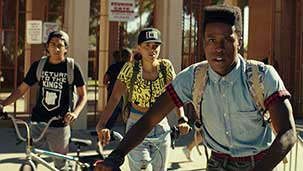Dope is as much a cultural artifact as it is a story. An artifact because it often only makes sense in relationship to the films that it depends on to first inform, and prop up, its central premise—movies like Juice, Boys N’ The Hood and especially Menace II Society.
These movies all dealt with the limited number of choices that inner city youth face. In the 1990’s the cinematic response to this dearth of choices usually took the shape of nihilistic acceptance, or sometimes defiance followed quickly by tragic consequences. Dope tries to sketch a third option. Bur that new option only makes sense, in this case, when contrasted with what came before. This is not necessarily an ineffectual strategy, but it does depend upon a prior knowledge of the genre, which is a risky approach.
Dope certainly begins with real promise. The main characters—a 90’s throwback nerd, a lesbian and a bro-y stick figure who all live in present day Inglewood CA.—aren’t types that conventionally populate the urban youth genre. Not to mention their single unifying principle—membership in the only new wave/thrash band in their zip code. It gave me hope that this might be a different take on an otherwise well-worn premise.
When this trio of high school kids becomes unwittingly embroiled in a drug transaction gone wrong is the moment when you make your first appearance (in this case as a knapsack full of MDMA) and also where the film goes a little off-track. Because McGuffins like yourself (as Hitchcock once described you—the thing that the spy’s are all concerned with but the audience doesn’t really care about) are only useful in very small doses.
In this case you trigger a convoluted narrative involving competing drug gangs, bit-coins, corrupt city officials and some pretty retrograde gender politics. This unnecessary baggage muddies what had begun as a pretty interesting—and sometimes funny—meditation on what it is like to be an outsider in a very specific set of circumstances.
While Dope seems intent on repudiating the underlining despair present in the films that it structurally mimics, it often falls into the very tropes it wants to undermine. It is, in some significant ways, a prisoner to the kind of inexorable logic that made the earlier films so powerful. They were expressing what seemed to be an unanswerable dilemma for the young men at the center of these stories, and one that also seemed to lack a win/win option. Caine in Menace II Society, Bishop in Juice, Doughboy in Boyz N’ The Hood all end up dead, caught up in lives that are circumscribed by mostly terrible options.
So when this film starts to lean more heavily on the standards of the genre, especially in the second and third act, those conventions tend to step on the more nuanced approach of the first act. Characters become much less three-dimensional as the story mechanics flatten them out. Plot starts to drive character and the film becomes less organic, more by the numbers.
But there is a lot to like here. Good central performances by a young cast, more than a few sharply observed moments that establish a strong sense of place, and a script that is ambitious and often surprising. Unfortunately, that promise fades away when you, Mr. McGuffin, take centre stage.
Certainly you’re useful as an entry point, a reason for the characters to engage and act. But when you become the focal point of the story, you’re revealed for what you are—a mechanism and nothing more. That kind of exposure means the rest of the film becomes an exercise of moving from a to b to c.
McGuffins, as is true of so many other aspects of cinema (like editing, or the soundtrack, or even the performances), are best when they go unnoticed. Sadly, in Dope, you draw far too much attention to yourself and what could have been a pretty good film is instead reduced to a self-defeating exercise.
Sincerely,

Tim







